Whether your podcast is a passion project, hobby, side hustle or burgeoning business, monetizing it effectively is a great way of deriving even more satisfaction and value from it. The podcast monetization landscape now has plenty of options, but that can often make it tricky for creators—what are the best platforms out there today, and what puts them ahead of the rest?
In this guide, we’re going to take you through the top 10 podcast monetization platforms, as well as what to look for when comparing the different platforms. By the end of it, you should know exactly what to look for and where to go if you need a new home for your podcast!
How Do You Monetize a Podcast?
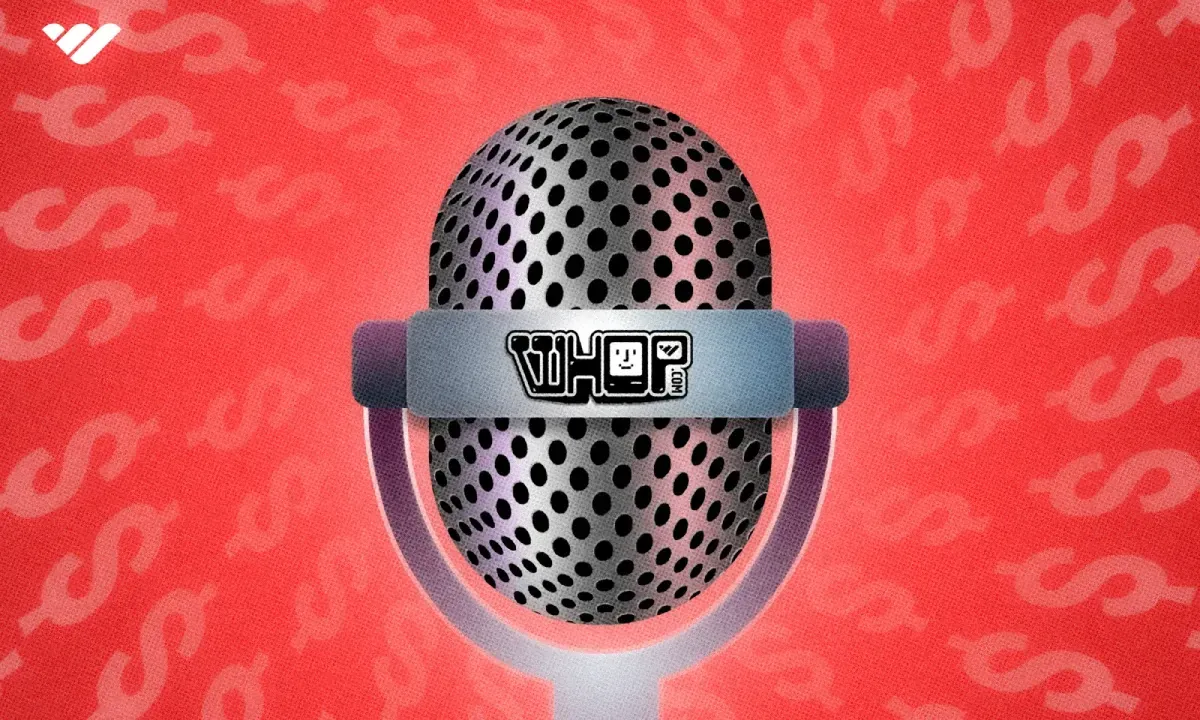
There are several ways to monetize a podcast, and they can be classed predominantly as direct and indirect monetization.
Indirect monetization bears mentioning first because it’s the traditional form of monetizing content—ads, for example, fall under indirect because your podcast is being used as a vehicle for the advertised product or service.
Direct monetization, on the other hand, means charging for more of the same—you might cover a topic on your usual show, but make available an extended edition or an uncut version to listeners willing to purchase it. Any kind of additional content you create falls under this category, while indirect monetization means using your content to sell something else.
With that out of the way, there’s still plenty to know about the different options for monetization. Advertising and sponsorships are the most traditional form of monetization, but what’s crucial for you is exactly how you can get them—many of the platforms on the list that follows have a dynamic ad placement mechanism to ensure monetization, and some even have bustling sponsor marketplaces that aim to connect you with brands’ ad budgets.
You can also hunt down ads and sponsorships yourself, but don’t neglect your audience itself as a direct source of revenue. Subscriptions and memberships are an extremely powerful way to earn, whether you’re looking for a small hand-out as a “thank you” for creating or a regular subscription for extra content or other benefits.
Those are the main ways to monetize, but if you want an in-depth guide on monetization to make sure you don’t leave a single cent on the table, keep reading!
10 Best Platforms for Podcast Monetization
Now that you know the basics of monetization, let’s take a look at our picks for the 10 best platforms to monetize your podcast.
1. 🏅Whop
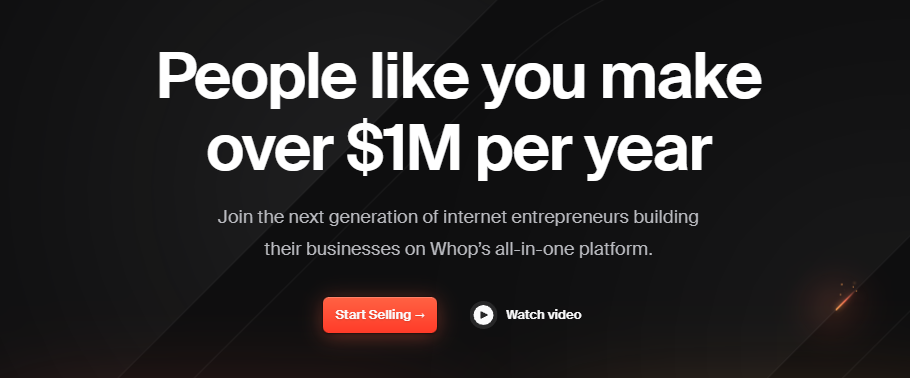
Whop is an all-in-one platform for digital entrepreneurs that you can use in addition to any podcast hosting or distribution platform to take your monetization to the next level. The platform provides you with a best-in-class digital store experience, allowing you to manage your subscriptions, take donations, or sell any sort of digital product whether that’s one-off or exclusive episodes, downloadables, courses, a community, or access to a gated portion of your podcast website.
Providing expertise in electronic fulfillment, Whop is a great business partner since it gives you access to even more geographies and currencies than ever before, meaning that your listenership can cover even more borders. Monetize your audience with subscriptions, sell access to your Discord or Telegram, design courses or software to complement your podcast, even write and sell an eBook—you can do it all with Whop.
Pros: Lets you sell any sort of digital product, has Merchant of Record services, takes a far lower share of your revenue than comparable platforms.
Cons: Doesn’t host or distribute your podcast.
Pricing: Free to sign up, and the basic plan only charges 3% on payments processed through Whop digital store.
2. PodBean

PodBean is one of the premier names in the podcasting world, and for good reason—it does most of what you want as a creator, helping to publish, promote, and distribute your podcast extremely effectively. It links up well with most major distribution platforms (including Apple Podcasts, Google Podcasts, Spotify and Amazon Alexa) and has a slick, user-friendly app of its own, and even automates social blasts if that’s something you want.
PodBean also offers several monetization avenues, including a dynamic ad insertion mechanism called PodAds. This, alongside the Ads Marketplace where companies can set up their own ad campaigns and then search for podcasts like yours that match their criteria, makes PodBean a very appealing option.
If you’re serious about podcasting, PodBean is a great choice for podcast hosting and even its own Patron option for donations and memberships. However, this might be the weakest area of the platform, so there’s no reason you shouldn’t publish on PodBean but use Whop for your subscriptions and member-only content!
PodBean has also introduced AI to the platform but does it smartly, providing audio enhancement features and the ability to generate chapters and transcripts automatically.
Pros: Native app, easy to use, customizable podcast page, publish and distribute to all major platforms.
Cons: Monetization via patronage isn’t as visible or powerful.
Pricing: Free up to 5 hours storage/100GB monthly bandwidth. Basic audio unlimited plan costs $9 per month, but you need the $29 option for patrons and the option to upload video.
3. Spotify for Podcasters

Formerly known as Anchor, Spotify for Podcasters is the biggest name on this list and thus gives you the advantage of potentially having access to the biggest audience. They know that too, and stand out when it comes to things like audience analytics and ensuring that your words hit as many ears as possible.
Spotify for Podcasters is a free platform, and it offers all-in-one services for podcasters meaning recording, hosting, editing, engagement and more all from one extended dashboard. This can definitely help speed up your podcasting journey, and the platform has seen plenty of adoption from popular podcasters all over the world.
There are plenty of avenues for monetization, too. Automated Ads, where sponsor-read ads are inserted automatically into host-selected ad breaks, are currently in closed beta and available for podcasts based in five countries. Then there’s also Podcast Subscriptions and Listener Support which equate to memberships and donations respectively, though the latter is only available in the US—and your podcast has to be hosted on the platform to qualify for any of these monetization options.
Pros: Free as a creator, platform is an all-in-one option for podcasters, and audience analytics are done really well.
Cons: You only earn 50% of ad revenue—after all, if the platform’s free, you’re the product. You also have to be invited to the ad program to earn any revenue at all. Donations are only available in the US.
Pricing: Free
4. Patreon

Patreon isn’t a podcasting platform per se, but it deserves a spot on this list just like Whop since it provides a fantastic way to monetize a podcast that’s hosted just about anywhere else. This can be a big deal for many podcasters thanks to the more stringent restrictions on some platforms and the passive listenership on others.
One of the best known names when it comes to the business of monetizing an audience irrespective of content, Patreon gets the job done for podcasters. It’s easy to publish premium episodes to your Patrons’ feeds, and there’s enough in the way of personalization and analytics to keep your podcasting business ticking along.
It’s also possible to sell digital exclusives in your own online store with Patreon now, and the shop rate of 5% is lower than Patreon’s traditional subscription rates of 8% and 12%, taken as a percentage of your earnings on the platform.
Pros: Trusted, established platform, can sell merchandise on the Premium 12% tier.
Cons: Expensive percentage rates cut into your revenues.
Pricing: 5% for digital store, 8% or 12% for subscriptions.
5. Castos
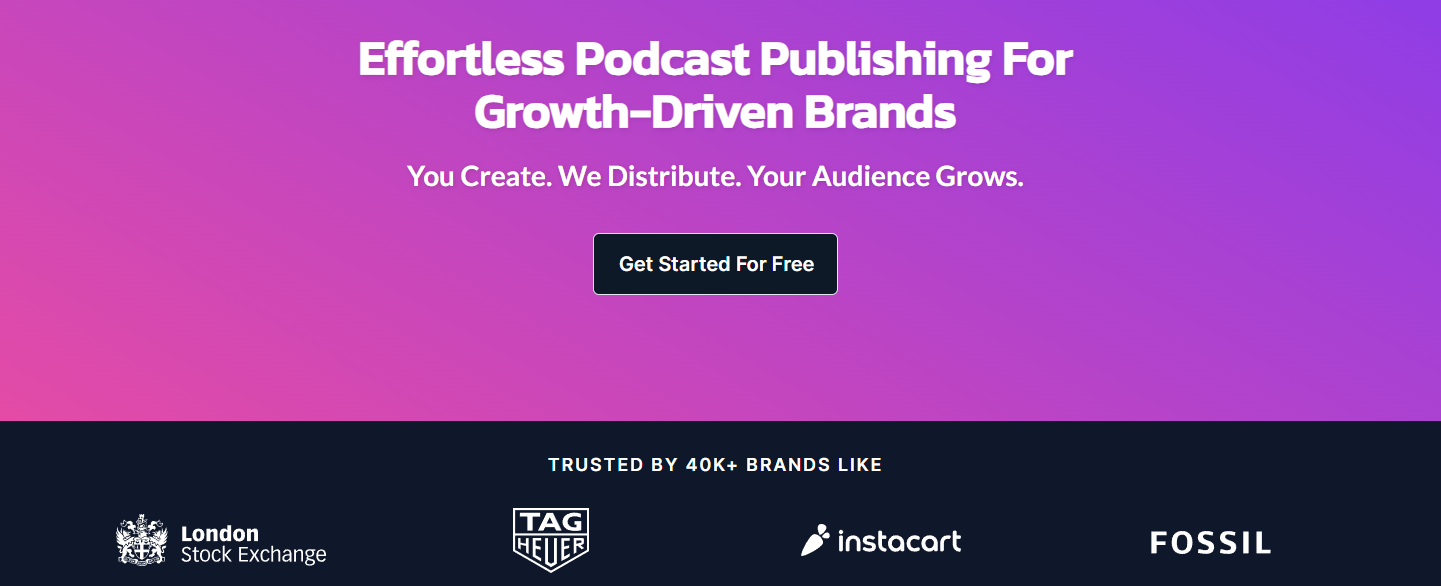
Castos is another top all-round podcasting software that can handle all of your podcasting needs. As a creator, you can get a lot of mileage out of this platform because it handles a lot of the basics for you, allowing you to publish on Castos but automatically distributing to Apple Podcasts, Spotify, and even YouTube.
You’ll find a lot of similarities with PodBean here, all the way down to how Castos uses AI to automatically generate transcripts for your shows. There’s also dynamic ad insertion as well as the option to directly monetize your audience via donations and exclusive content.
Castos is also an excellent choice when it comes to customization, because they offer customizable podcast websites as well as their own “Seriously Simple Podcasting” plugin if you already have a Wordpress site for your pod.
Pros: Makes it easy to manage podcast workflow, automatic transcription and distribution.
Cons: Limitations on Private Subscribers even on higher-end plans, and they have to be handled by email/unique RSS.
Pricing: Basic “Essentials” plan starts at $19 per month with tiers at $49, $99, and $499 for high-volume publishing.
5. Libsyn

Libsyn is a podcasting platform that takes monetization seriously, and it’s an excellent choice if you plan to take your podcasting journey to great heights. It caters toward growing podcasts, so if you’re on an upward trajectory and need to find the perfect host, you’re what Libsyn is looking for.
The platform provides global distribution and full control of your show, and their hosting plans are based on how consistently you upload. Bandwidth is unlimited, but you’ll probably choose your plan depending on how many hours of content you want to upload, with the Advanced plan offering 10 hours of uploads along with IAB Verified Advanced stats.
You have full access to podcast monetization on all tiers, and Libsyn has a native subscription service where you can offer exclusive content. Once you hit 2000 downloads per episode you can get access to Libsyn ads, letting you earn via host-read or programmatic ads.
Pros: Multiple monetization options, custom branding across artwork, podcast website and even video and audio players.
Cons: Upload limits may be restrictive depending on your content.
Pricing: $7 Basic tier gives you 3 hours of uploads per month, but $20 Advanced tier gives you more uploads as well as better analytics and social promotions.
- How Much Does it Cost to Start a Podcast? From Equipment to Hosting Platforms
- The Best Podcast Apps for Audio Lovers
- The Best Podcast Hosting Platforms (Including Free and Low-Cost Options)
- How to Get Podcast Sponsors (and Where You Can Find Them)
6. Buzzsprout
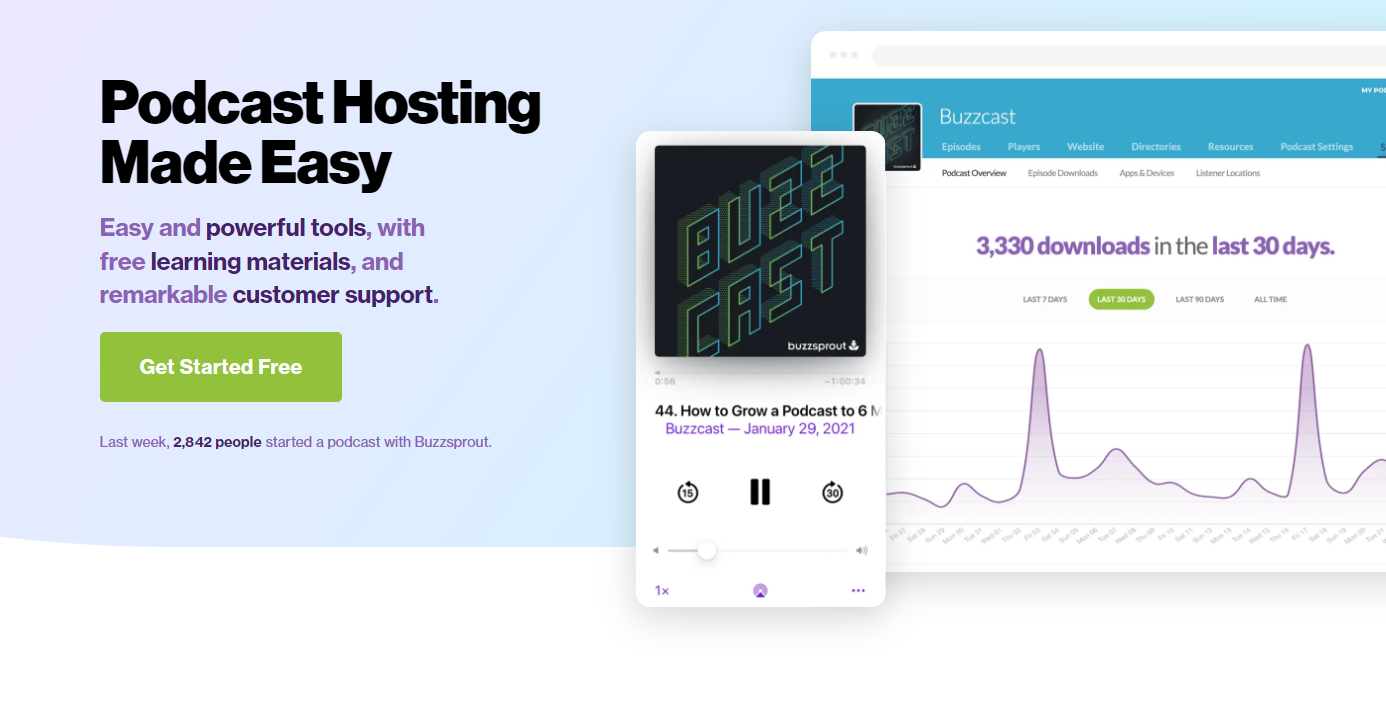
Buzzsprout is an extremely popular podcasting platform with a serious set of features to consider. Options like episode transcription and “Dynamic Content,” which allows you to change pre- and post-roll segments even after publishing, can make life a lot easier—and that’s even without mentioning Buzzsprout’s automatic optimization feature, although it’s also notable that all uploads are converted to 96kbps.
The platform does just about everything you want when it comes to podcast hosting and distribution, and has several monetization options too. You can make exclusive content available to and take donations from your fans, and also make use of ads and sponsorships directly from the platform.
With Buzzsprout, you’ve got to think about how much content you want to upload. That’s what pricing mostly boils down to, with the free plan allowing just 2 hours a month and the top $24 option allowing 12 hours of content—note that you can go over the limit, but it’s cheapest to do so on this top plan.
Pros: Cheap, easy to use platform if you’re not a high volume podcaster and don’t need extremely high audio quality.
Cons: You need to pay far too much attention to your upload volume and bandwidth.
Pricing: Free option for 2 hours of content per month, 3 hour tier costs $12, 6 hour tier costs $18, and the 12 hour tier costs $24.
7. Acast
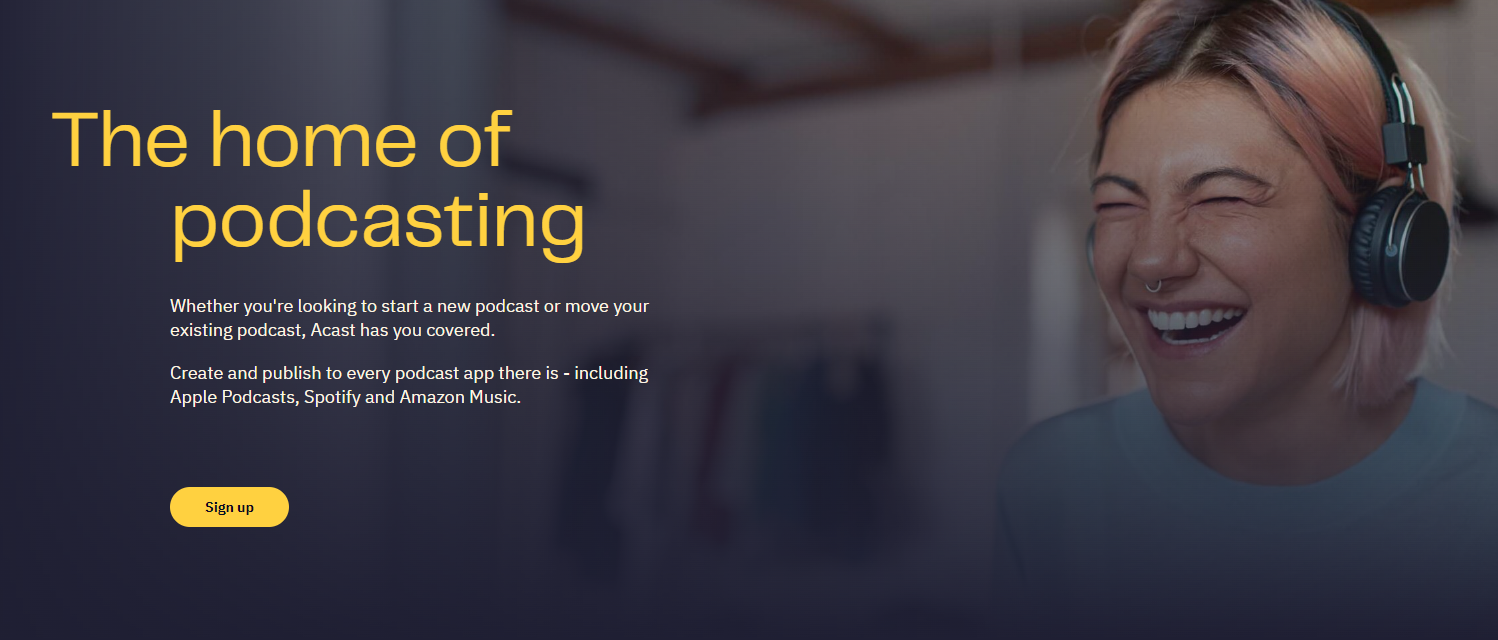
Acast is a popular podcasting platform that makes it easy to record, edit, and mix your podcast but also gives you plenty of monetization options. It’s a good all-on-one choice for podcasts of different audience sizes, helping to promote your content while backing you up on the data and analytics side of things too.
The platform features a self-serve advertising platform that allows you to run pre-recorded ads as well as book host-read sponsorships, with the twist that you can pick and choose where the ad breaks go. The Acast+ membership options also allow listeners to support you through subscriptions and one-time donations, so every option’s on the table.
Pros: Multiple monetization options and customizable ad placement, free plan has plenty of features.
Cons: No video podcasts, limited file formats and sizes for upload.
Pricing: There’s a free option, plus two tiers at $14.99 and $29.99 per month billed annually. Acast also takes 15% of subscriber earnings.
8. Simplecast
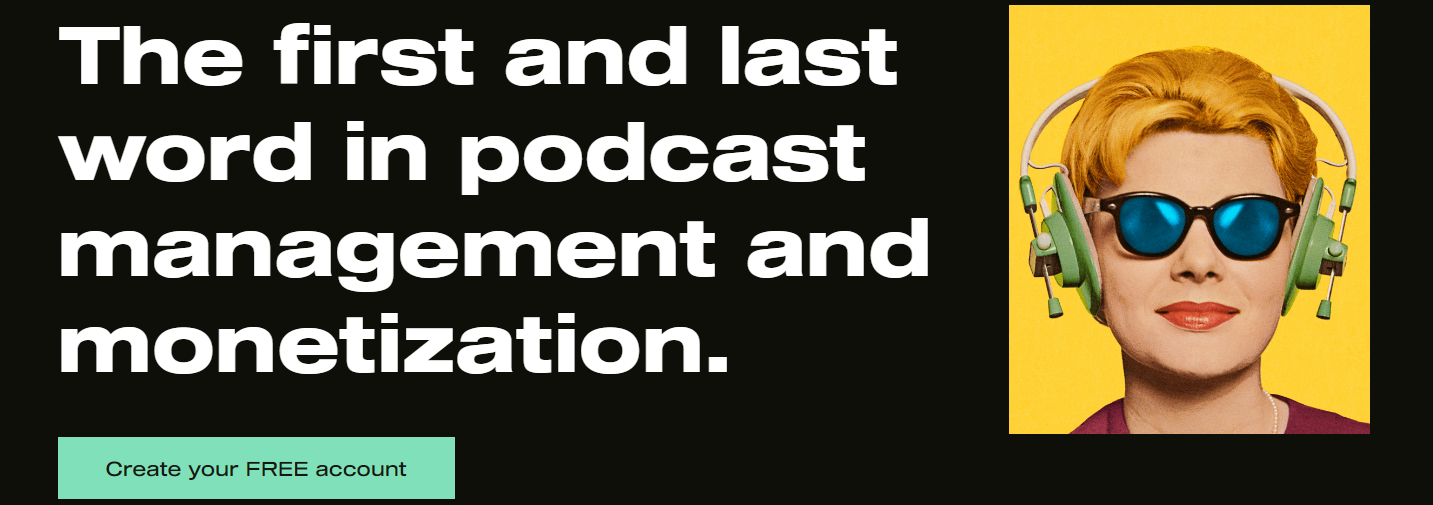
Simplecast is a podcast hosting and management platform that gives you a customizable podcast website when you sign up, as well as an embeddable web player. It does all of the essentials well, including one-click publishing to get your sound on the top distribution platforms.
Targeting established brands and indie creators alike, Simplecast gives you a lot of agency over monetization via inventory controls, allowing you to manage placement, pricing, and the nature of the ads that are run on your show. The Simplecast Marketplace is the part of the ads iceberg you may not see, but it’s got some of the world’s biggest brands looking to place ads on podcasts like yours.
Pros: Very powerful analytics tools for creators, reputable ad marketplace.
Cons: No on-platform memberships, subscriptions, or donations.
Pricing: $15 or $35 per month for the independent podcaster plans with unlimited uploads but a set download cap per month.
9. Blubrry
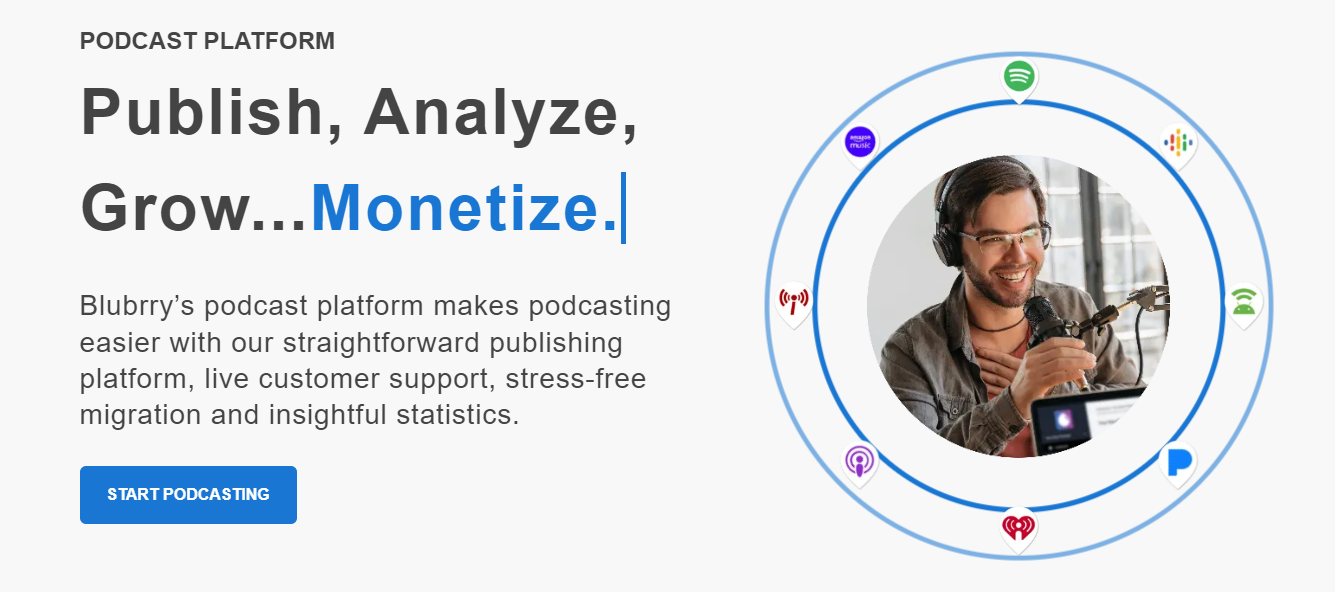
Blubrry is home to well over 150,000 podcasters, and it’s usually the top choice for podcasters who take their analytics and metrics seriously. Known for its top of the line data and analytics suitors as well as industry-leading IAB Certified Compliant Statistics, Blubrry will likely be your host of choice if you’re all about the numbers.
It’s also a solid option if you want to integrate with your existing WordPress website via Blubrry’s plugin, although signing up with Blubrry also gives you a WordPress site to play with if you’re starting from scratch. Transcription services are also part of the deal, but you’ll have to keep an eye on the storage allowances across the different pricing plans.
Pros: Managed WordPress site, excellent data and statistics, video-to-podcast service in advanced pricing tier.
Cons: Not much in the way of on-platform monetization outside of programmatic advertising although you get dynamic ad insertion in the top pricing tier.
Pricing: $12 per month for standard hosting, $20 for advanced and $100 for professional. Students get 50% off the first two plans.
10. Captivate

Captivate is a very competitive option for podcasts of all sizes despite being at the bottom of this list—after all, we’re going for a top 10 rather than a best-and-worst! It’s an especially interesting choice if you’ve got a small audience or are even starting from scratch thanks to Captivate Growth Labs, which is included in all plans and gives podcasters lots of learning resources.
The platform does distribution well and has several useful marketing tools for you to play with, and there’s plenty of options when it comes to monetization too. There are ads on the platform as well as tips and subscriptions, and your brand is well taken care of thanks to the level of customization available on all plans.
Pros: Plenty of customization, strong analytics, unlimited number of shows, uploads, and storage.
Cons: More expensive than several other options.
Pricing: Three plans at $17, $44, and $90 per month billed annually.
What to Look For in a Podcast Monetization Platform
We’ve touched on different aspects of each of our top 10 platforms for podcast monetization, but each podcast is unique and every podcaster has different priorities. To make it easy to find the perfect platform, here’s a brief look at what to look for when you’re considering which platform(s) to use.
Pricing
This one’s a big deal whether you’re just starting out or an established podcaster looking for a new home. We’ve compared the prices of each option above so you’ve probably already drawn some conclusions, but if you’ve got a membership program, there’s a huge difference going from the 12% of Patreon Premium or the 15% of Acast+, down to the 3% fees charged by Whop.
Monetization
Depending on the nature of your podcast, some monetization options may be more advantageous or simply easier to sell than others. Think about which forms of monetization would suit you best, then go for the platform (or mix of platforms) that’ll get the job done. You might choose to host on PodBean for its audience and number of advertisers present, but then rock your memberships and complementary digital product offerings on Whop.
Distribution
When signing up for a platform, definitely consider distribution since it’ll play a big part when it comes to how much reach and how much of an audience you’re likely to get. Spotify is a big name in the business but distributes primarily on Spotify, while a lot of the others list on Spotify as well as the other major platforms such as Apple, Google, Samsung, and Amazon.
Hosting
The different podcasting platforms we listed tend to look at hosting differently, so pay attention to what they offer and how the different plans work. You’ll want to match your content strategy to the platform that offers you the right deal in terms of things like file formats, bitrate, number of downloads per month, as well as the number and size (time-wise as well as disk storage) of uploads.
Other Features to Look For
While these might not be quite as make-or-break as the previous, these features may also be worth looking at when you’re picking a podcast platform:
- Analytics and Metrics
- Video Uploads
- Transcription Services
- Learning Resources
- Customization and Branding
- WordPress and other integrations
Monetize Your Podcast Today with Whop!
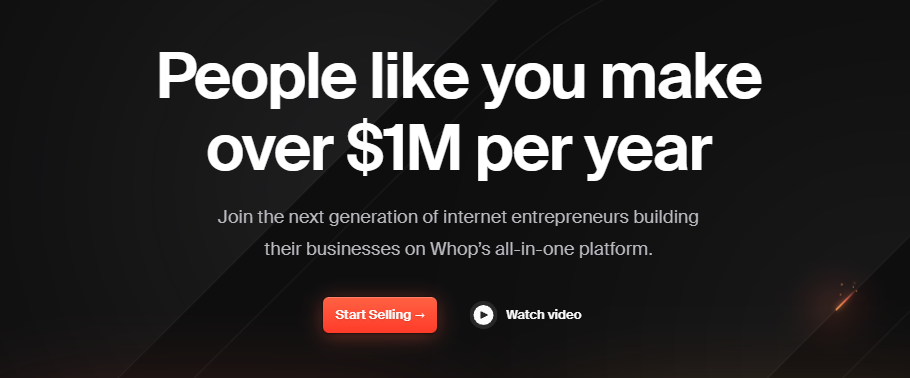
Podcasting is a lot of fun and creates an incredible amount of value, but the real trick as a podcaster is going about monetization right. There are a lot of platforms out there to look at, but your challenge is to pick the right combination of offerings—getting it spot-on when it comes to hosting and distribution to ensure that you’ve got a high-quality product that gets listened to, but also giving yourself every opportunity to earn through memberships, subscriptions, and digital products that make sense as accompaniments to your podcast.
So, make sure you take a look at Whop for your podcast. Combining excellent discoverability with the ability to effectively and efficiently complete digital fulfillment for just about any digital product you can think of, Whop makes monetization through product sales, donations and subscriptions an absolute cinch.
FAQs
How do Podcasts make money?
There are a variety of ways podcasts make money, but the main ways are through sponsorships and advertisements on the one hand, and subscriptions and memberships on the other. Companies love to associate themselves with popular podcasts, but listeners are often just as happy to fork out a little extra for exclusive, ad-free content.
How to get advertisers and sponsorships?
A lot of the platforms we’ve featured have ad placement mechanisms, but sometimes getting ads and sponsorships is a matter of doing the leg-work and digitally cold-calling prospective brands. Find companies that operate in or are related to your niche, and put together a marketing kit—if a partnership makes sense, it’ll happen.
Can you only use one platform for your Podcast?
No! You might choose a single platform to host your podcast (especially if it distributes to the major podcast lists) but you can combine that with other or even multiple subscription and membership platforms. For example, you could host and get ads from PodBean, but run your subscriptions, donations, and sell digital goodies on Whop.
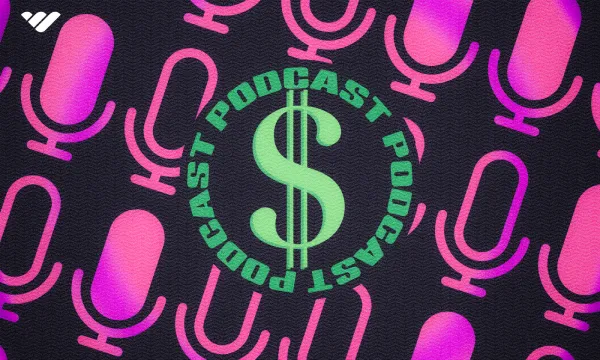

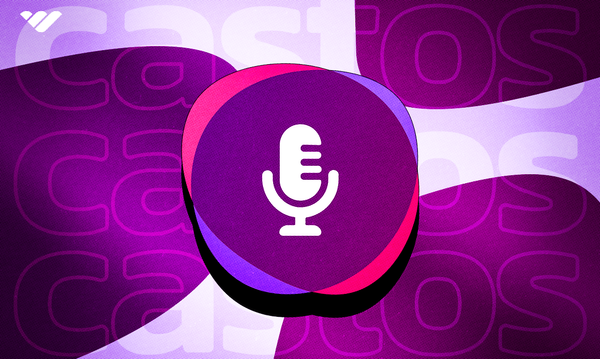

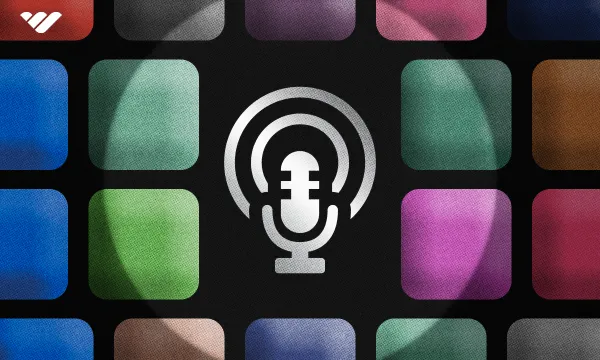
![Spotify for Podcasters: Complete Review & Tutorial [2024]](/blog/content/images/size/w600/2024/10/Spotify-for-Podcasters-Review--Tutorial.webp)